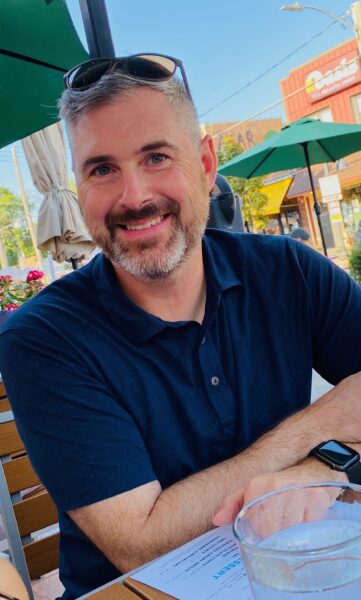Rustin Gates is an associate professor at Bradley University. He lives in Iowa City, Iowa, and has been a member since 2000.

Rustin Gates
Social Media: https://rustingates.academia.edu
Alma maters: BA (history), Occidental College, 1996; MA (regional studies—East Asia), Harvard University, 2000; PhD (history and East Asian languages), Harvard University, 2007
Fields of interest: Japanese diplomatic, East Asian international relations, imperialism, Cold War, Japanese pop culture
Describe your career path. What led you to where you are today?
After teaching English in Japan for a year and then working for another year for a Japanese company in Manhattan I entered the Regional Studies—East Asia Program at Harvard. For my master’s degree, I combined my love of history and my interest in Japanese language and culture to pursue modern Japanese history—a new field for me. I then kept going with it as PhD student in history and East Asian languages. My first love was US history, but my foreign language was Japanese, and I had family connections to Japan. By becoming a historian of modern Japan, I was able to pursue both of my interests of historical studies and Japanese culture.
How have your historical interests evolved across your career?
Early in my career I focused on prewar Japanese foreign relations at the highest government level. I moved on to explore pan-Asianism but this was still squarely related to Japanese diplomacy, just at a slightly lower level. Now my interests have evolved to become more locally focused. I tend to do more public history-oriented work now that appeals to the local community rather than my true roots as a Japanese diplomatic historian.
What projects are you currently working on?
Japanese American resettlement in the Midwest during the Pacific war.
What is your favorite historical site to visit?
Pearl Harbor. There is a powerful memorial there and something to which my students can easily relate.
What’s the most fascinating thing you’ve ever found at the archives or while doing research?
In the Japanese foreign ministry archives, I found the handwritten version of a biography on the Japanese foreign minister (Uchida Yasuya) who was the subject of my dissertation. I had the published copy but that was only an abridged version of the 10,000-page handwritten edition that I found. This biography proved to be indispensable in my research.
Who in your life served as a teacher or mentor and influenced your understanding of history?
My AP US History teacher in high school (Karen Hoppes) taught the class like a college course, complete with lecture, book review papers, bluebook midterms and finals, and a primary source-based research paper. I loved every minute of it. I continued all these activities in undergrad and, obviously, graduate school. And so, my love of history has been constant. I now do these things in my own classes (including bluebooks)—not sure my students are feeling the same love, though!
What do you value most about the history discipline and community?
I value the curiosity and breadth of knowledge that historians bring to their work. Given the nature of our discipline, historians know a little about everything—and of course a lot about their particular field. We are specialized generalists. Accordingly, historians offer insight AND perspective better than most in other disciplines.
Do you have a favorite experience with the AHA?
The AHA annual meeting in 2007 is my favorite experience. That is where, as a graduate student, I interviewed for my current position. The meeting and interviews were all so exciting but also overwhelming. Some of the interviews went well and some not so much. Fortunately, in the end, that annual meeting proved to be decisive for my career as a professor of history.
AHA members are involved in all fields of history, with wide-ranging specializations, interests, and areas of employment. To recognize our talented and eclectic membership, Perspectives Daily features a regular AHA Member Spotlight series.
This work is licensed under a Creative Commons Attribution-NonCommercial-NoDerivatives 4.0 International License. Attribution must provide author name, article title, Perspectives on History, date of publication, and a link to this page. This license applies only to the article, not to text or images used here by permission.
